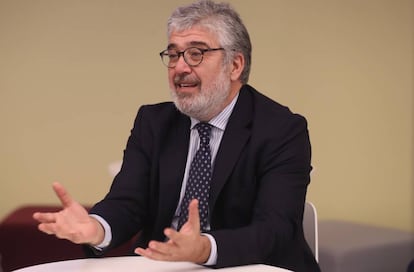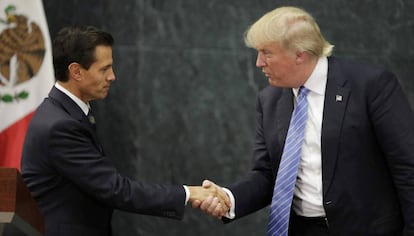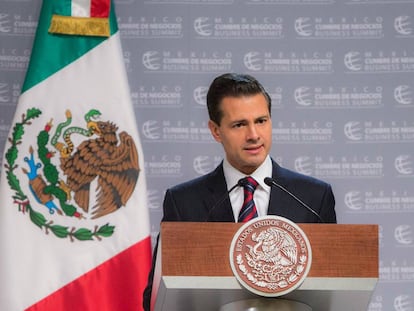¡°Renegotiating NAFTA might not be a terrible thing¡±: IDB chief economist
Trade deal could do with revision, says Jos¨¦ Juan Ruiz of the Inter-American Development Bank

Spaniard Jos¨¦ Juan Ruiz, chief economist and manager of the research department at the Inter-American Development Bank (IDB), denies that the victory of Donald Trump in the race to become president of the most powerful country in the world will have apocalyptic consequences.

Although he is not a fan of the current fashion for protectionism across much of the developed world, the economist defends the idea that the North American Free Trade Agreement (NAFTA) ¨C which has been heavily criticized by the US President-elect ¨C needs to be updated for the 21st century.
Question. How will the Trump victory affect Latin America?
Answer. Economic reality is much more complex and more a question of overall balance than hasty analysis would suggest. The only certainty is that we have entered a period of deep uncertainty and that we have to be more flexible and not close off options. The capacity to react is more important than the shocks in themselves. I think there has been bit too much excitement about setting off the alarm bells.
Q. You don¡¯t seem too worried¡
Increased trade in raw materials and a weaker currency could be good for countries like Brazil
A. I don¡¯t think we are living in an apocalyptic world: I don¡¯t think everything bad is going to happen at the same time. It¡¯s a very sensible move to slowly and carefully analyze all possible scenarios using the data available. Not everything is black and white and goes in the same direction. John Adams, one of the founding fathers of the US, said we live in ¡°a government of laws and not of men.¡± And I believe that while men ¨C leaders ¨C are important, institutions are important too. The US is complex enough to face such rapid changes.
Q. Mexico has been one of Trump¡¯s main targets and people are warning there could be a possible recession. How much will Mexico¡¯s economy suffer in this new era?
A. Stronger growth in the US and a stronger dollar will mean a more competitive Mexico. It will have a positive impact on the price of raw materials, which is closely linked to growth in Latin America. When commodity prices rise and the world economy grows, the region also grows.
But it¡¯s not all positive. A stronger dollar also means raw materials don¡¯t rise in price as much and high interest rates in countries that bring in capital accelerate the process of fiscal consolidation in order to generate savings.

Q. Are you worried about the possible scrapping of NAFTA?
A. The integration of Mexican and US value chains is so significant that you can¡¯t say with certainty that the scrapping of NAFTA would be a disaster. It¡¯s an old commercial deal. It is probably due for a revision already because the commercial reality between both countries is now very different. It would be a mistake to get rid of it for non-economic reasons. But renegotiating it and adapting it wouldn¡¯t necessarily be a bad thing.
Q. In what way?
This is not a zero-sum game in which the US wins and Mexico loses
A. In an intra-industry sense. This is not a zero-sum game in which the US wins and Mexico loses. Producers with firms such as Ford and General Motors come and go from the US to Mexico during the production process. It doesn¡¯t make sense to think of the world as being so simple that when you import a car [into the US], a job goes in Detroit. Intentions are one thing and reality ¨C which is much more complex than people usually think ¨C is another.
Q. But is Trump ready to renegotiate NAFTA?
A. We don¡¯t have any information about what he will do. Until we find out how he will tackle these problems, it would be rash to speculate. It¡¯s hard to believe he will adopt measures that will end up being to the detriment of the groups he is trying to protect.
Q. Will any Latin American countries come out on top if Trump¡¯s policies are implemented?
A. Some will be more heavily affected than others because shocks are asymmetrical. And yes, some could find themselves positively affected: increased trade in raw materials and a weaker currency could be good for countries such as Brazil. For others, like Argentina, it could be good in terms of demand but negative because borrowing costs will rise. Even in a situation of extreme protectionism, Latin America will only be affected if global demand slows down. The less connected a country is to global value chains, the lower that cost will be. But Mexico, which is integrated into US value chains, would suffer.
English version by George Mills.
Tu suscripci¨®n se est¨¢ usando en otro dispositivo
?Quieres a?adir otro usuario a tu suscripci¨®n?
Si contin¨²as leyendo en este dispositivo, no se podr¨¢ leer en el otro.
FlechaTu suscripci¨®n se est¨¢ usando en otro dispositivo y solo puedes acceder a EL PA?S desde un dispositivo a la vez.
Si quieres compartir tu cuenta, cambia tu suscripci¨®n a la modalidad Premium, as¨ª podr¨¢s a?adir otro usuario. Cada uno acceder¨¢ con su propia cuenta de email, lo que os permitir¨¢ personalizar vuestra experiencia en EL PA?S.
?Tienes una suscripci¨®n de empresa? Accede aqu¨ª para contratar m¨¢s cuentas.
En el caso de no saber qui¨¦n est¨¢ usando tu cuenta, te recomendamos cambiar tu contrase?a aqu¨ª.
Si decides continuar compartiendo tu cuenta, este mensaje se mostrar¨¢ en tu dispositivo y en el de la otra persona que est¨¢ usando tu cuenta de forma indefinida, afectando a tu experiencia de lectura. Puedes consultar aqu¨ª los t¨¦rminos y condiciones de la suscripci¨®n digital.










































